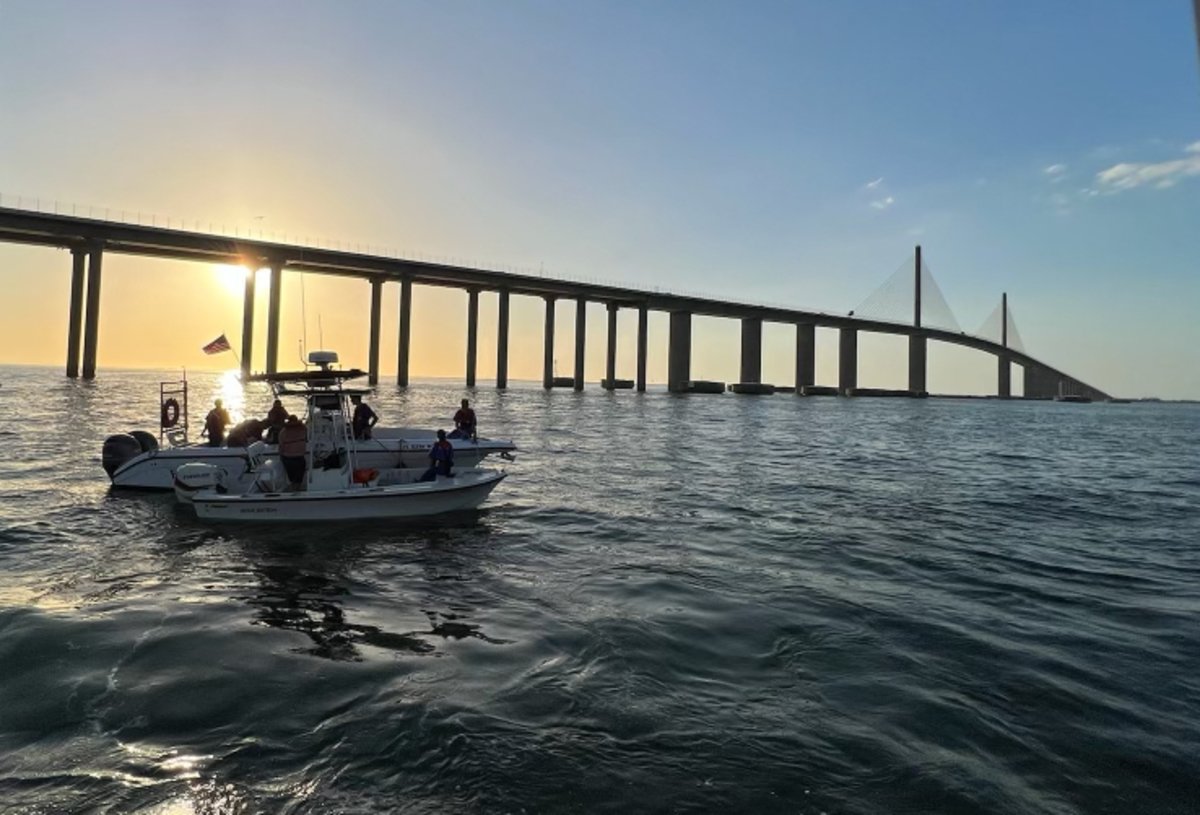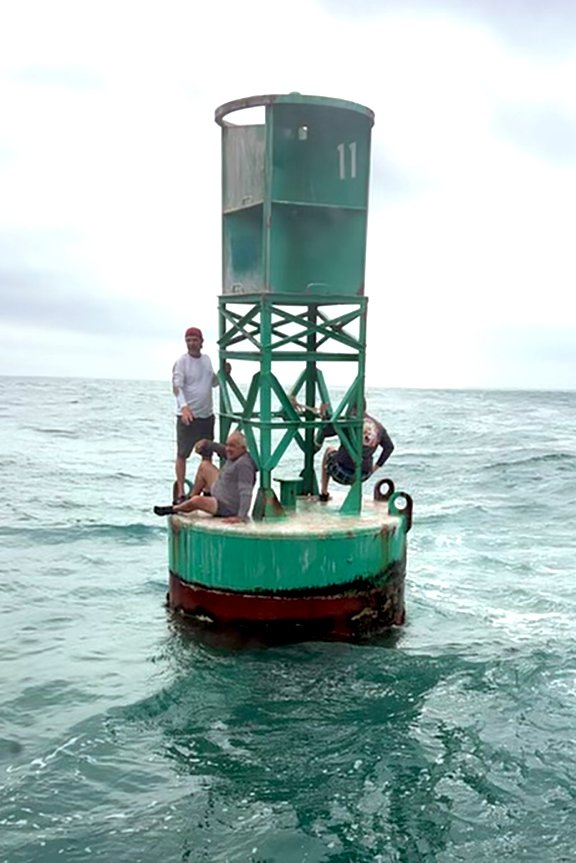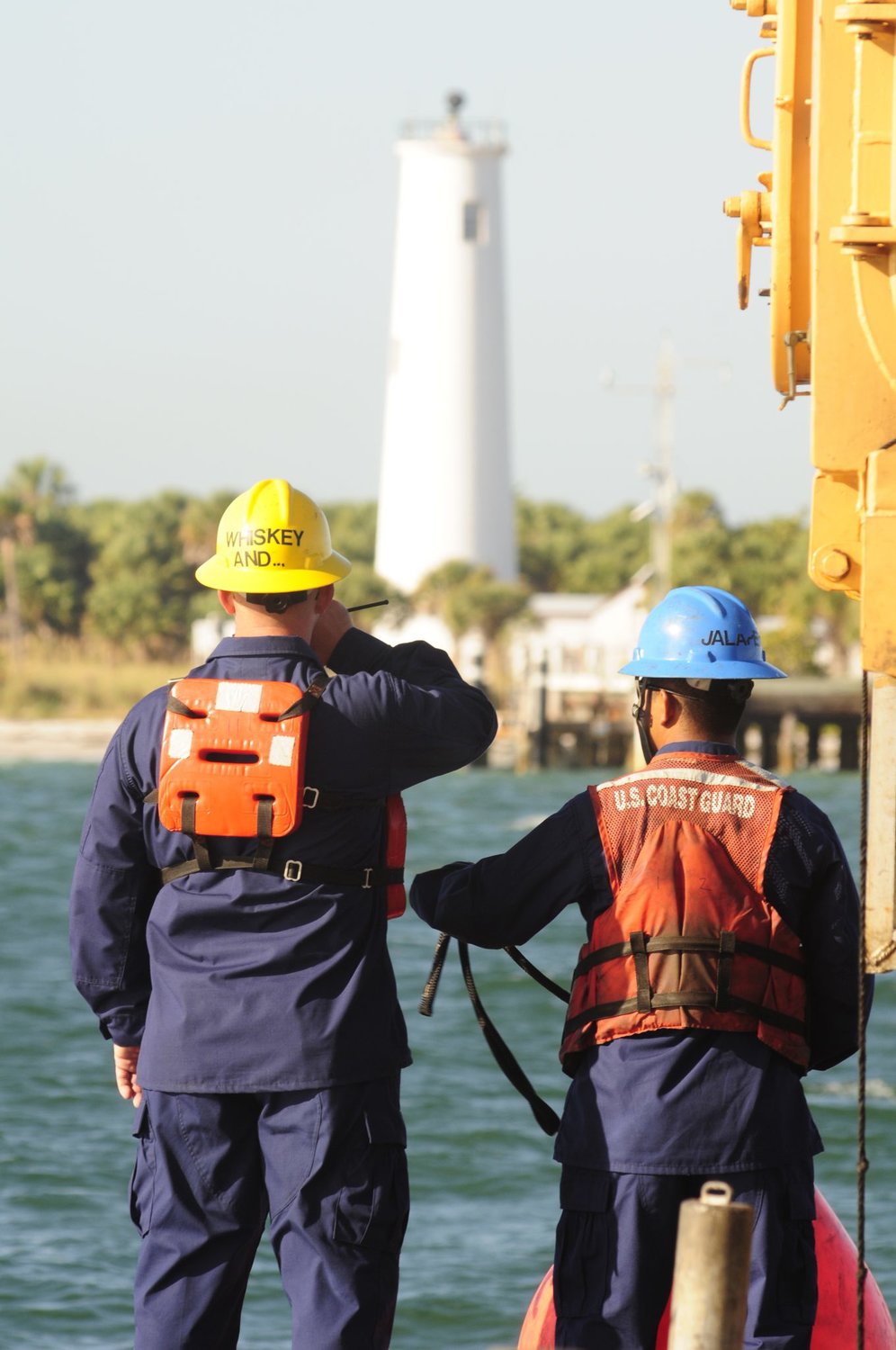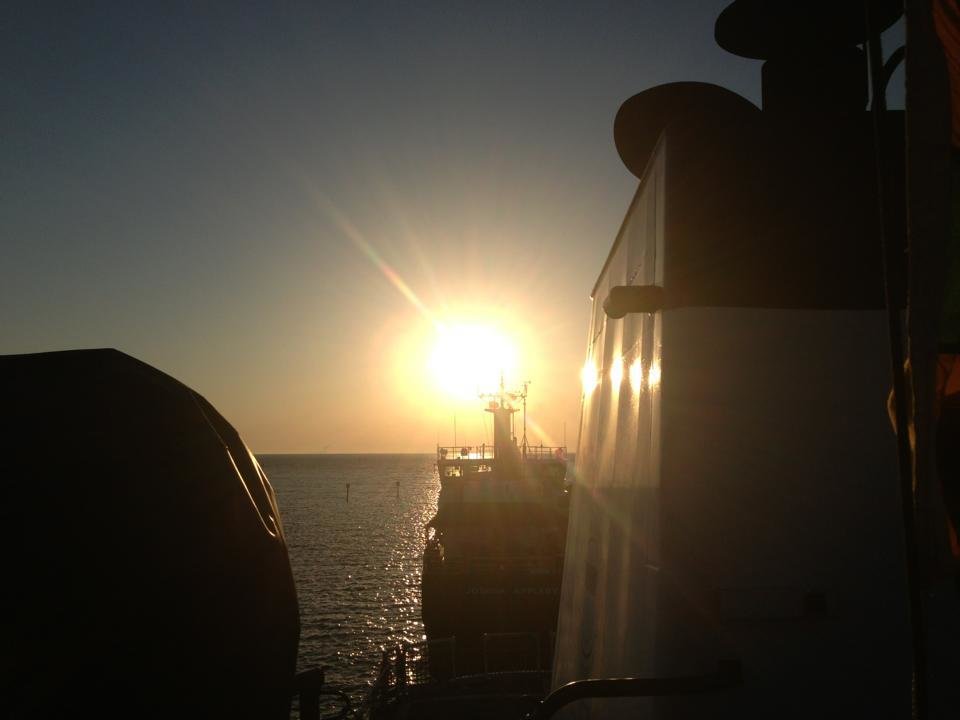
A US Coast Guard Station St. Petersburg 45-foot response boat-medium crew assists three people on a vessel taking on water in Tampa Bay, March 6, 2022. The boat crew worked to drain the 17-foot boat, and Eckerd College Search and Rescue transferred the three people while towing the vessel to a boat ramp in Bradenton. US Coast Guard photo.
When US Coast Guard Boatswain’s Mate 2nd Class Joseph Duran and his crew on board their 45-foot response boat-medium left Station St. Petersburg on Saturday, May 21, they didn’t know much about the unfolding disaster in Tampa Bay.
Watchstanders had received a brief emergency VHF marine radio channel 16 call from a 24-foot vessel. The boat’s GPS location put it roughly 6 nautical miles off Florida’s shoreline. That’s about a 35-minute trip for the Coast Guard coxswain and his four crewmates from their homeport. But Duran didn’t know how many passengers might need to be rescued or even what had happened to the vessel to trigger the maritime mayday. And when the coxswain and his crew arrived at the GPS coordinates, they found nothing but ocean.
Did the boat go down? Duran told Coffee or Die Magazine that, in those situations, they look for “orange life jackets and people in the water,” but there was no sign of a capsize.
So they kept searching.
Egmont Key loomed into sight, and then so did one of the many marker buoys peppering the waves around the island’s state park and national wildlife refuge. The floating markers warn mariners about natural and artificial reefs, important ecological sites to be protected, and even shipwrecks that could snag boaters sailing above them.
Duran said he looked at the buoy and could “kind of tell there was something on it.” And the next thought racing through his brain was, That’s probably them!

Duran counted three people in shorts and shirts, no life vests, stranded on the bobbing buoy. And then he saw nearby lines snaking from the top of the water to the bottom of the bay.
“You could barely see the hull of the boat,” he told Coffee or Die, but the “whole thing was submerged.”
Duran’s a salty petty officer who’d already completed a tour at Sector Los Angeles Long Beach before he arrived in Florida six months ago. So he figured, if his boat started going down by the key, he’d probably steer toward a buoy and try to climb aboard it, too.
With the relief of Duran’s crew spotting survivors came the next wave of worries. Are they suffering from hypothermia? Did any of them get knocked in the head or experience other injuries when the boat capsized? Were there any other passengers who never made it to the buoy?
Duran needed to talk to the men on the marker, but waves kept crashing into his rescue boat. The coxswain and his crew would need to position their vessel perfectly or risk getting slammed into the buoy.

“It’s not a good place to be, right in between the buoy and our boat,” he said.
They pulled alongside perfectly, and Duran’s crew got two of the stranded men into the rescue boat quickly, but then the waves began crashing into the vessel again.
The coxswain had to reposition the boat again, waiting for the waves to quiet, before he could retrieve the third passenger. Then the crews began to talk.
All on board the now-sunken boat had made it to the marker, Duran learned, and their only injuries were some scraped shins from the barnacles speckling the buoy.
Duran said they were distraught about losing the boat, but they were also glad to be rescued. Officials said the vessel’s owner would coordinate with a commercial salvor to recover the sunken boat.

But US Coast Guard leaders also remain concerned about boaters who aren’t wearing flotation devices when disaster strikes. In 2021, four out of every five US boaters killed at sea were lost to drowning, and 86% of the victims weren’t wearing life jackets, according to the maritime agency.
Duran told Coffee or Die he wasn’t sure if the rescued passengers even had life jackets on the capsized vessel, but “if they had sunk anywhere where there wasn’t a buoy, they would have had a lot harder time in the water.”
Duran urges all boaters to stow reliable life jackets on board their vessels and always fill out a float plan before heading to sea. He also advises downloading the Coast Guard mobile application, which includes a float plan to file, an easy way to request emergency assistance or report pollution and hazards to navigation, and even pinpoints the nearest National Oceanic and Atmospheric Administration buoy.
“From personal experience, in cases where we do have a float plan available, those are the ones where we find a lot more people,” he said.
Read Next:

Noelle is a former staff writer for Coffee or Die through a fellowship from Military Veterans in Journalism. She has a bachelor’s degree in journalism and interned with the US Army Cadet Command. Noelle also worked as a civilian journalist covering several units, including the 75th Ranger Regiment on Fort Benning, before she joined the military as a public affairs specialist.
BRCC and Bad Moon Print Press team up for an exclusive, limited-edition T-shirt design!
BRCC partners with Team Room Design for an exclusive T-shirt release!
Thirty Seconds Out has partnered with BRCC for an exclusive shirt design invoking the God of Winter.
Lucas O'Hara of Grizzly Forge has teamed up with BRCC for a badass, exclusive Shirt Club T-shirt design featuring his most popular knife and tiomahawk.
Coffee or Die sits down with one of the graphic designers behind Black Rifle Coffee's signature look and vibe.
Biden will award the Medal of Honor to a Vietnam War Army helicopter pilot who risked his life to save a reconnaissance team from almost certain death.
Ever wonder how much Jack Mandaville would f*ck sh*t up if he went back in time? The American Revolution didn't even see him coming.
A nearly 200-year-old West Point time capsule that at first appeared to yield little more than dust contains hidden treasure, the US Military Academy said.












